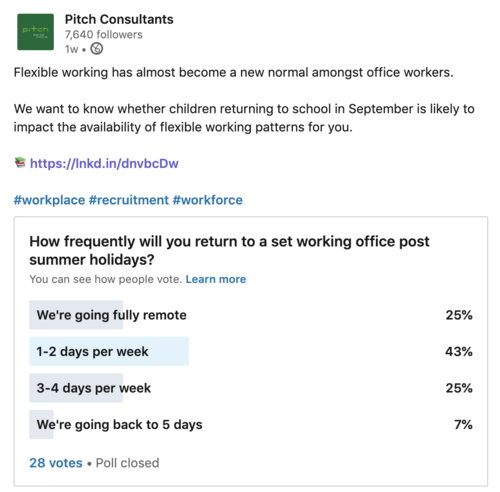Returning to office - A recruitment perspective
Posted over 4 years ago by Rebecca Thomas.jpg)
As pressure mounts from government for businesses to return to office spaces, employers are facing difficult choices surrounding how they can adapt their working space to be safe for teams.
However, many are finding this is not a viable option for their whole team, with the majority of large and small business owners having no plans to return staff to the office in the immediate future, or enforcing a hybrid approach to accommodate smaller teams throughout the week. Some are going as far as adopting a fully remote working pattern to save costs on commuting and office space.
Whilst logistically reducing the amount of time spent in office can be a benefit, it is important for business owners and decision makers to consider the wider picture and how their current and future employees may respond.
What are employees expectations around remote & flexible working?
To tackle this question we went straight to our candidates to get their thoughts.
Due to saving money on commuting costs and having more time with family members, employees are generally favourable to employers offering flexible working options. 61% of candidates questioned favoured a hybrid working pattern over one which is fully remote or offers flexible start/finish times.
A hybrid working pattern is one which splits the working week between a physical office space and remote home-based working. According to our Linkedin research, this is currently the preferred option for business owners, with the majority of employees working between 1-2 days per week.

What recruitment benefit does hybrid working bring to businesses?
Whilst hybrid working brings a range of logistical and some productivity benefits to organisations, enforcing this approach can have a positive impact on your employer brand, recruitment and employee retention long-term.
Employee retention
This is especially relevant as the impact of lockdown has had a largely negative effect on employee sentiments towards their organisation, with 60% of furloughed staff and 40% of those working from home looking for a new job.
Typically this is due to employees feeling a lack of involvement, satisfaction and compatibility with their employer.
Research indicates that improving the working environment through listening to employee concerns and needs can have a positive impact on staff retention due to reducing pressures in the working environment. However it is important to remember that this is a short-term solution to rebuilding employee brand trust, and to maintain employees long-term, overall staff satisfaction in roles will need to be increased.
Retaining employees can bring a variety of benefits to organisations, from maintaining productivity to reinforcing a positive work culture. However more importantly, the lower a companies turnover rate the less money is spent on hiring and training costs.
Attracting new employees
Whilst business owners can do their best to retain employees through creating a positive culture, inevitably some staff will leave either to enhance their career or livelihood.
Including flexible working options which directly meet candidate expectations in the market is likely to have a positive impact on recruiting the right staff for your organisation. An anticipated 60% of candidates would consider the benefits package as a major decision when deciding to accept a job offer, with 80% choosing strong benefits over a pay rise.
If as a business you are in a position where hiring is necessary, enforcing hybrid working is likely to enhance the attractiveness of your benefits package and thus company appeal over some competitors. As a result you may be able to gain some leeway with applicants if salary increases are not on near the horizon, however we advise you continually assess your position here in order to maintain skilled workers long-term.
Accessing more diverse talent
By including an attractive flexible working option within employee benefit packages, your accessibility to a more diverse pool of talent is likely to increase as a business. Not only will you be able to attract talent from further afield who are willing to take on a longer commute for a few days per week, but you will also be able to access a market of talented parents and students who may require increased flexibility to fit in life routines.
Increasing your prospective talent pool can only be a benefit to your business, as it opens the opportunity to tap into some harder to find skill sets which may benefit your business in the long-term.
If you are looking to hire new employees for your business and want to know whether your benefits package is competitive in the market, please get in touch with one of our consultants.
Image credit




